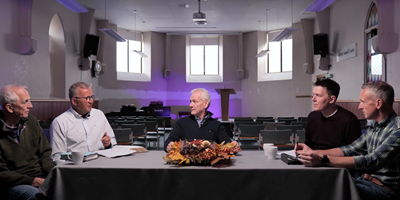One promise that will be realised in the future is that every member of the body of Christ (i.e., every true believer from the whole of this "church" age) will share in reigning with Him. Presently the believer is called to endure, in the knowledge of what is assured for the future:
“If we endure, we shall also reign with Him” (2 Timothy 2:12a).
“Blessed and holy is he who has part in the first resurrection. Over such the second death has no power, but they shall be priests of God and of Christ, and shall reign with Him a thousand years” (Revelation 20:6).
Unfortunately the church at Corinth was acting in such a manner that Paul could sarcastically accuse them of reigning in this present age:
“You have reigned as kings without us—and indeed I could wish you did reign, that we also might reign with you!” (1 Corinthians 4:8b).
Paul did have a desire to reign with them, but he knew this was not the time for that. When the Lord Jesus returns to this earth and sets up His physical kingdom, there will be a 1,000-year reign that believers of this present age will share in. That is truly something than can be longed for, as God has promised it will happen.
In the meantime the call is to share the reproach, despising and shame that the Lord Jesus suffered when He was upon this earth.
There will be a time of glory, but first there is a time of reproach. As with our Lord, so it is with His people. He suffered the cross, knowing it must come before the crown.
He was tempted to bypass the path set out before Him:
“Then the devil, taking Him up on a high mountain, showed Him all the kingdoms of the world in a moment of time. And the devil said to Him, "All this authority I will give You, and their glory; for this has been delivered to me, and I give it to whomever I wish. Therefore, if You will worship before me, all will be Yours." And Jesus answered and said to him, "Get behind Me, Satan! For it is written, 'YOU SHALL WORSHIP THE LORD YOUR GOD, AND HIM ONLY YOU SHALL SERVE'” (Luke 4:5-8).
An unwavering commitment to worship and serve God meant that He came down from that mountain to continue a life where He would be rejected and despised by many and, in perfect obedience, “He humbled Himself and became obedient to the point of death, even the death of the cross” (Philippians 2:8b).
The Corinthian believers thought highly of themselves, and misjudged or chose to ignore how the believer would be treated in this world. Likewise, for those in the 21st Century it is a real temptation to entertain thoughts and choose a path that would eliminate or greatly lessen reproach or shame. If the Christian life is “your best life now” then someone omitted to tell Paul and the other apostles, as their writings are full of instructions to endure hardship, expect persecution and anticipate abuse.
Paul contrasted the prideful attitude of the Corinthians with the experience of himself and others.
He could state, in 1 Corinthians 4, that in this world we are seen as:
“Men condemned to death” – Using imagery that would have been well-known at the time, Paul alludes to the end of a gladiator event when the poorest and weakest prisoners were brought out to fight with wild beasts. Truly a humiliating experience, but that is how Paul, who could have had a “great religious career” as a Jew, was treated because of his service for Christ.
“Fools for Christ's sake” – The world then and now thinks that the message of the gospel is foolish. Paul was prepared to be seen as a fool by men and women, if that was what it meant to be faithful in proclaiming the whole truth about Jesus Christ.
“Dishonoured” – Whereas the Corinthians loved to be honoured and praised, Paul could state that he was dishonoured in this world. He did not seek honour and praise from men, and he would not compromise his witness for Christ so that he might be esteemed highly in the world. The word Paul uses for himself, and the other apostles could be translated “despised”. In that way they followed our Lord Jesus, who was “‘despised and rejected by men” (Isaiah 53:3a).
Although we could consider other descriptions given in 1 Corinthians 4, these three give us a summary of how Paul and other apostles were treated. They were certainly not reigning, but knew that one day they would reign.
The great challenge for the Lord’s people is to have the attitude of Paul and not that of the Corinthians. Our enemies, the flesh, the world and the devil, will tempt us to compromise to avoid reproach and shame. The time for reigning will come but first it is the way of the cross; the glory will follow. If suffering, persecution and dishonour are to mark the Lord’s path for us, may we look to Him for the grace and power to follow it.































